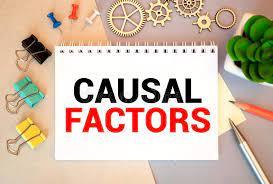What is Causal Factors


Introduction
Some studies have suggested that the average business professional spends 3 hours every week solving work-related problems! Problem-solving may unfold differently depending on the industry, or even the department you work in. But most of us will agree that before you can fix any issue, you need to be clear on what it is, why it’s happening, and what your ideal long-term solution will achieve.
Understanding both the nature and the cause of a problem is the only way to figure out which actions will help you resolve it.
Objective
The causal factor is considered to be “contributing to a result without which the result could not have occurred.” In this article, we learn how a causal factor can affect a process/product, how it is different from the root cause and what are the possible questions to ask so that it can be avoided/minimized.
Read More: https://bit.ly/Step1DefineProblem
Definitions (ISO 9000: 2015):
Complaint (clause 3.9.3): Expression of dissatisfaction made to an organization related to its product or service or the complaints handling process itself where a response or resolution is explicitly or implicitly expected.
Corrective Action (Cl 3.12.2): Action to eliminate the cause of nonconformity and to prevent reoccurrence.
Causality: It is a cause-and-effect relationship, i.e., a relationship between two events where one causes the other. One event is thus the cause and the other the effect. The cause is shown before the effect.
Read More: https://bit.ly/ProblemSolvingTechnique
Detailed Information:
The term “Causal Factor” came from the System Safety Development Center in Idaho Falls, Idaho. It was part of an investigation tool called “Events and Causal Factors Charting.”
Causal Factor:
A major unplanned, unintended contributor to an incident (a negative event or undesirable condition), that if eliminated would have either prevented the occurrence of the incident or reduced its severity or frequency. Also known as a critical causal factor or contributing cause.
Causal Factors are NOT root causes – they are the ‘Root Cause Analysis’ starting point!!
- The most important part of the definition of “causal factor” is the word “contributor.”
- The causal factor isn’t the single factor that drove the event. Instead, a causal factor was one of a few influences.
- The event could still occur again or would have happened without the causal factor.
Read More: https://bit.ly/CorrectionContainmentInterim
How Causal Factor is different from the Root Cause?
Root Cause: It is a fundamental reason for the occurrence of a problem or event
The root cause is the primary driver of the event, and causal factors are secondary or tertiary drivers.
How to identify Causal Factors?
- Direct observation
- The “so what” method
- The three-question method (Cause, Effect, Intervening Factor)
Read More: https://bit.ly/RootCauseAnalysis3L5Y
Necessary conditions to establish a Causal Relationship?
To establish a causal relationship, three necessary conditions must be met: Cause, Effect, and Intervening Factor. The cause is the original cause of the effect, while the intervening factor is the factor that causes the effect to occur after the cause. In other words, the intervening factor is the “link” between the cause and effect.
Example:
Cause: Traffic Jam
Effect: Material damage as the vehicle took the route where the road condition was bad
Intervening Factor: How to reach the customer location on time
Read More: https://bit.ly/IshikawaDiagram
Possible questions to ask to reduce/avoid:
- What was the incident?
- What was the key causal factor for the incident?
- What have we wanted to achieve?
- If there was an opportunity to avoid/minimize the incident?
- Were there any 4M (Man, Machine, Material, Method) failures that resulted in the incident?
- Was there any future possibility of another similar incident to happen which has not yet been observed or acted upon?
- What was the key cause which led to the failure?
- Which failure in the 4M (Man, Machine, Material, Method) resulted in making the incident worse?
Read More: https://bit.ly/7ProblemSolvingTechnique
References:
IATF 16949: 2016
ISO 9001: 2015
ISO 9000: 2015
Industry Experts
This is the 150th article of this Quality Management series. Every weekend, you will find useful information that will make your Management System journey Productive. Please share it with your colleagues too.
In the words of Albert Einstein, “The important thing is never to stop questioning.” I invite you to ask anything about the above subject. Questions and answers are the lifeblood of learning, and we are all learning. I will answer all questions to the best of my ability and promise to keep personal information confidential.
Your genuine feedback and response are extremely valuable. Please suggest topics for the coming weeks.

Recent Comments